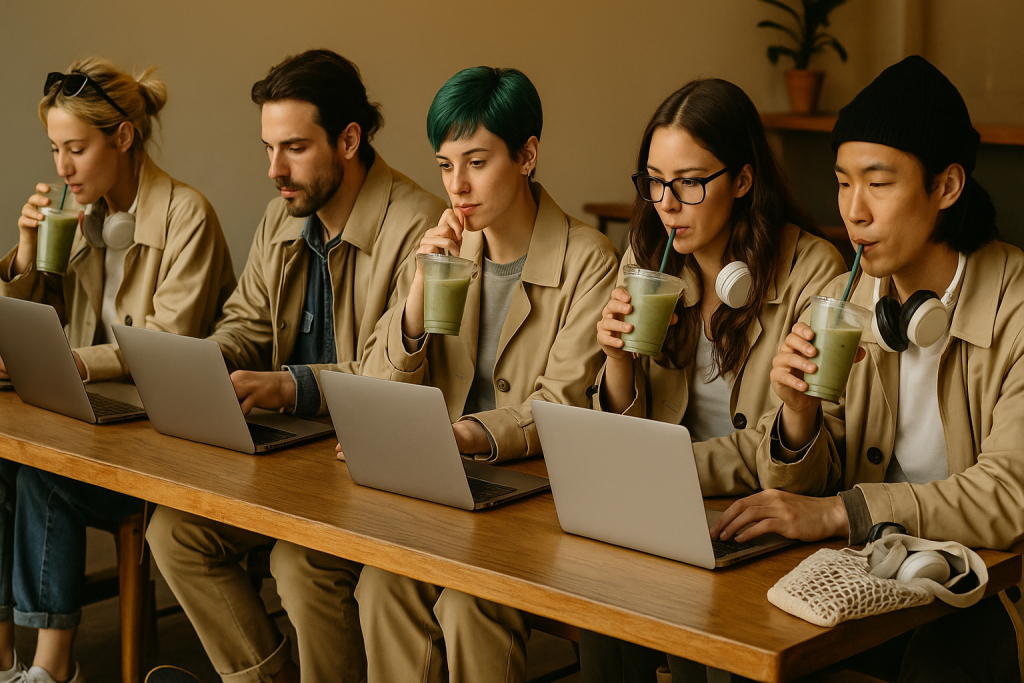There’s a beautiful paradox in human nature: everyone thinks they’re not like everyone else. We walk around convinced of our uniqueness while doing the exact same things to prove it. It’s like shopping at the same individuality store, then acting surprised when we match.
The phrase “I’m not like other people” has become its own cliché. The harder we try to stand out, the more we blend in. We’ve built entire industries around being different—which millions participate in, missing the irony entirely.
What’s fascinating isn’t that we’re all more similar than we think. It’s that our attempts at uniqueness follow such predictable patterns. We’re all different in exactly the same ways.
1. You prefer “authentic” neighborhood spots
You avoid chains because you’re too original for Applebee’s. You seek that dive bar with exposed brick, the coffee shop with mismatched furniture. You post about “hidden gems” with 4,000 Yelp reviews. You support local businesses, unlike those corporate sheep.
Everyone thinks they discovered that speakeasy behind the unmarked door. The authenticity economy thrives on millions fleeing manufactured experiences for supposedly real ones. That dive bar charges $15 for cocktails because people like you need to feel special ordering them. The owner drives a Tesla bought from people avoiding mainstream spots. You’re not bucking the system—you’re in a parallel one.
2. You hate small talk (so profound)
You can’t stand surface-level conversation. While others discuss weather, you crave deep discussions about existence, meaning, and whether we’re living in a simulation. Small talk physically pains you. You’re just wired for deeper connections than most people.
Except everyone hates small talk. Scientists found people consistently underestimate how much others want meaningful conversation. We all think we’re the only ones desperate to skip “how about this weather?” But someone has to go first. Your hatred of small talk is the ultimate small talk topic—everyone agrees immediately.
3. You’re “weirdly obsessed” with true crime
You have this dark fascination others might find disturbing. You’ve watched every documentary, listened to every podcast, and have theories about unsolved cases. You joke that you know too much about disposing of bodies. Your friends call you morbid, but you can’t help being drawn to the darker side of human nature.
Welcome to the club including half of all Americans. True crime is a multi-billion dollar industry because millions share your “weird” obsession. Netflix doesn’t greenlight its tenth serial killer series for a niche audience. Your dark fascination is as mainstream as pumpkin spice. You’re not weird—you’re a demographic.
4. You’re an “overthinker”
Your brain never stops analyzing, questioning, dissecting every interaction. You lie awake replaying conversations, finding hidden meanings in text messages, creating problems that don’t exist. You wish you could be simple like other people, but you’re cursed with a mind that won’t quit.
The overthinking epidemic is so universal that anxiety researchers can’t find control groups who don’t do it. Everyone’s lying awake wondering if their “sounds good” sounded passive-aggressive. We’ve all analyzed a semicolon for signs of emotional distance. Your racing thoughts aren’t special—they’re standard equipment. The only people not overthinking are underthinking about how much they overthink.
5. You need alone time to “recharge”
You’re not antisocial, you’re just an introvert who needs solitude to function. After social events, you require complete isolation to recover your energy. You’re not like those extroverts who gain energy from others. You’re different—you need your alone time.
Congratulations on discovering what every human being needs: time alone. Even the most extroverted people require solitude. The introvert/extrovert binary has become astrology for people who think they’re too smart for astrology. Everyone needs to recharge. Everyone finds people exhausting sometimes. You’re not a special battery type—you’re human.
6. You see through society’s BS
You recognize social media is fake, news is biased, and capitalism is a scam. While others sleepwalk through life, you see the matrix. You question everything, trust nothing, and understand how the game really works. You’re awake while everyone else dreams.
Here’s the beautiful irony: everyone thinks they see through the BS. Nobody identifies as someone who falls for propaganda. We all think we’re the critical thinker surrounded by sheep. The bias blind spot means everyone sees bias everywhere except in themselves. Your skepticism isn’t special insight—it’s the standard position of feeling special.
7. You’re “bad at texting”
You forget to respond for days, leave people on read, and can’t maintain digital conversations. It’s not personal—you’re just not a phone person. You prefer face-to-face interaction, real connection, not this artificial texting culture everyone’s obsessed with.
The entire internet is full of memes about being bad at texting because everyone is bad at texting. We’re all drowning in conversations we don’t want to have, responding three days late with “sorry, just saw this!” Nobody’s good at maintaining seventeen simultaneous text threads while living an actual life. Your communication failures aren’t a personality trait—they’re a universal struggle with an impossible system.
8. You have a dark sense of humor
Your humor is too twisted for most people. You make jokes about death, existence, and uncomfortable truths others can’t handle. You find comedy in darkness where others see only tragedy. Your friends say you’re “too much” sometimes, but you can’t help seeing the absurdity in everything.
Dark humor is so common it has its own Netflix category. Everyone jokes about death, depression, and existential dread now. It’s called millennial humor—an entire generation’s coping mechanism. Your dark wit isn’t edgy—it’s algorithm-approved content that gets the most engagement.
Final thoughts
The real irony isn’t that people claiming uniqueness are ordinary—it’s that being ordinary is actually fine. We’ve created this exhausting culture where everyone needs to be special, different, not like other people. But the things making us feel unique—our struggles, thoughts, preferences—are often what connect us most deeply.
Maybe the truly radical act isn’t being different but admitting you’re mostly the same. You overthink, need alone time, hate small talk, watch too much true crime. So does everyone else. That’s oddly comforting.
The pursuit of uniqueness has become so universal that conformity might be the last rebellion. But even that thought isn’t original—thousands are having it right now, all convinced they’re the only one seeing the pattern.
We’re all special in exactly the same way: we think we’re special. And somehow, that shared delusion might be the most human thing about us. The joke isn’t on those who think they’re different—it’s on all of us, together, which is exactly where we’ve always been.
What’s Your Plant-Powered Archetype?
Ever wonder what your everyday habits say about your deeper purpose—and how they ripple out to impact the planet?
This 90-second quiz reveals the plant-powered role you’re here to play, and the tiny shift that makes it even more powerful.
12 fun questions. Instant results. Surprisingly accurate.


Leave a Reply
You must be logged in to post a comment.